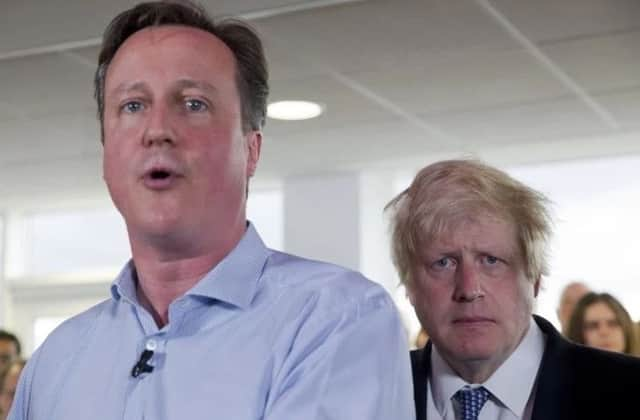What happens now that Britain has voted for Brexit


With the vote going against David Cameron, it is no surprise that he has announced his decision to stand down and make way for another Tory leader to negotiate Britain’s exit from the EU.
However, it is only his notice that he has submitted to the British people. He intends there will be a new leader in place by October – the start of the Conservative Party conference, despite calls from his own party for him to stay for now. However, the PM believes that fresh leadership was needed to invoke Article 50, which triggers the UK leaving the EU.
Advertisement
Hide AdAdvertisement
Hide AdThe impact of the Brexit vote is likely to be considerable on the financial markets. More than £100 billion was wiped off the FTSE 100 as the index fell more than seven percent, while the pound also crashed eight percent against the US dollar. Share prices, banking stocks and multinationals are likely to be hardest hit, but with an inevitable ‘trickle down’ of the misery to the rest of us.
It is possible that in order to try to stem the fall in sterling, the Bank of England will put up interest rates – at least in the short term. This would have a very “real world” effect, as it would mean the cost of mortgages and borrowing would immediately rise for us all. Governor Mark Carney has announced that the Bank of England will make an additional £250bn available to the banks “to support the functioning of markets.” It will also be able to “provide substantial liquidity in foreign currency, if required.”
Michael Saunders, a new member of the Bank of England’s Monetary Policy Committee, has said he expects the pound to come under severe pressure. When he was working for Citibank, he wrote that Brexit risks were “nowhere near priced yet”, adding that Britain should expect between 15 and 20 per cent depreciation of sterling against its main trading partners.
The Bank has already said it has contingency plans in place in the event of Brexit. Some of these plans will take place regardless of the vote. It will hold additional auctions of sterling to ensure the banking system has sufficient funds to operate in a potentially chaotic moment.
Advertisement
Hide AdAdvertisement
Hide AdWhile all the rhetoric of the campaign has been about the catastrophic consequences of Brexit, the Chancellor George Osborne will now have to do everything he can to calm the markets.
Expect him to emphasise how long it will take for a negotiated exit to take place, and expect him to reassure the markets that there will be no change in Britain’s relationship with Europe for at least several years.
The name of the game will be buying time. Mr Osborne may also announce he will stand down as Chancellor when a new Tory leader is elected.
He would almost certainly rule himself out of the race to succeed David Cameron and would probably jump before he is pushed out of the Treasury.
Advertisement
Hide AdAdvertisement
Hide AdDavid Cameron will invoke Article 50 of the Lisbon Treaty.This is a legal mechanism by which Britain withdraws from the EU. Mr Cameron could do this at any time, but it is perhaps most likely to happen at a meeting of EU heads of state on 27 June. Given Brexit, this meeting will be of crucial importance. It will be the first time that all 28 member states will be able to take stock of the decision.
But don’t expect any decisions at this meeting – Mr Cameron will not be the person negotiating Britain’s exit, so anything of substance will be put on hold until a new Prime Minister is in place.
Pundits expect Boris Johnson and Theresa May will announce they will stand to become the next Prime Minister
Boris Johnson appears to be the man to beat in the race to become David Cameron’s successor. In these circumstances, the only two figures who could realistically challenge him are Michael Gove and Theresa May. Mr Gove may rule himself out, preferring to be Boris’s kingmaker rather than a contender. But Mrs May is almost certain to stand. She has kept a low profile during the campaign: she has come out in favour of Remain (which will disadvantage her), but she might still come through to win as a steady but tough hand on the tiller through turbulent times. South Northamptonshire MP Andrea Leadsom has also emerged as a front-runner after her high-profile performances on national debates.
Advertisement
Hide AdAdvertisement
Hide AdThe results show a stark division within the UK with Scotland’s strong pro-Remain vote creating exactly the scenario Nicola Sturgeon and the SNP warned of - Scotland being dragged out of the EU against its will. The Nationalists said this was the kind of issue which could trigger a second independence referendum and now there will be many pushing for just such a move.
Ms Sturgeon will still not wish to risk another independence vote unless she is sure she will win it, but the Brexit vote may well stir up enough outrage among Scots to make a majority believe independence is now a better option.
And with Northern Ireland also voting to Remain, Brexit could mean the reintroduction of checkpoints with the North being the only part of the UK sharing a land border with a EU state. However, a much greater constitutional problem could emerge with calls for a poll on a united Ireland.
Sinn Fein’s national chairman Declan Kearney said: “The British Government have now forfeited its mandate to represent the north of Ireland in relation to the European Union.” Leader Gerry Adams had previously tweeted “If referendum votes to leave EU Sinn Féin believes there should be a border poll.”